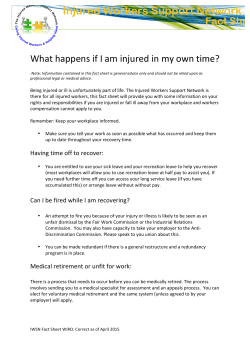
DECISION - Defence Force Remuneration Tribunal
DFRT14/37 Australian Government Defence Force Remuneration Tribunal DECISION Defence Act 1903 s.58H(2)(a)—Determination of the salaries and relevant allowances to be paid to members LANGUAGE PROFICIENCY ALLOWANCE (Matter No. 12 of 2014) THE HON. A. HARRISON, PRESIDENT THE HON. A. BEVIS, MEMBER CANBERRA, 10 JUNE 2015 BRIGADIER W. ROLFE, AO (Ret’d), MEMBER [1] This decision concerns an application made by the Australian Defence Force (ADF) to vary Language Proficiency Allowance from an allowance administered under s.58H of the Defence Act 1903 (the Act) – Functions and Powers of Tribunal to an allowance administered under s.58B of the Act - Minister may make determinations. [2] This matter was considered in hearing; Mr R. Kenzie appeared for the ADF and Mr J. O’Reilly for the Commonwealth. Background [3] Language Proficiency Allowance (LPA) is payable to members of the ADF who attain a specified standard of proficiency in an approved language and who perform, or are liable to perform, linguistic duties in the course of their service. The purpose of the allowance is to encourage ADF members to become proficient in an approved language and to assist them in maintaining that proficiency. [4] LPA was first considered by the Tribunal in 1992. At that time it changed from a s.58B allowance to an allowance administered under s.58H of the Act. As part of the Salary Related Allowance Review (SRAR) in 2012, the ADF submitted that disability was not a factor which warranted remuneration for the allowance and that in essence the allowance was an “incentive payment to gain and retain capability” [and] as such…should remain outside the Salary Related Allowance Structurei. At that time the Tribunal and Commonwealth agreed. Decision – Language Proficiency Allowance – Matter 12 of 2014 1 [5] In 2013 the Defence Force School of Languages changed the way languages were being taught and assessed from a proficiencyii assessment to a competencyiii based training assessment. The ADF submit that LPA currently only recognises members who reach a standard of proficiency in language and not a standard of competency. Submissions [6] The ADF submissioniv proposed to repeal DFRT Determination 14 of 1992v to enable the ADF to establish a “Language Allowance” under s.58B of the Act. In their submission the ADF is proposing to: a. repeal DFRT Determination 14 of 1992 – Language Proficiency Allowance b. establish a new Language Allowance under s.58B of the Act, and c. inform the Tribunal of: i. the new competency based language training and assessment structure which will be incorporated alongside the proficiency based structure, and ii. a change of name from LPA to Language Allowance (LA). [7] The Commonwealth supportsvi the changes based on consistency with the SRAR and considers it “appropriate for the ADF to have discretion and flexibility to adjust its language allowance structure”; they see “no harm in the allowance being moved managed and maintained by the ADF”. However, concurrently the Commonwealth consider there are “few impediments to the ADF seeking amendment to the allowances as and when needed under s.58H…”vii. [8] In the hearing the ADF confirmed that the eligibility for LPA will not change and that the rate(s) will continue to be determined as a result of the member’s proficiency but “also, alternatively, be determined as a result of the member’s level of competencyviii”. They will, in short, continue to receive the same remuneration for the language skills as they presently do but within a different structure of proficiency and competency assessment. [9] The ADF submit that they consider that the move between jurisdictions is “something that is best addressed through an approach which allows flexibility” and that “in an operational zone…the need to actually reflect the particular language or languages that are relevant to that field of operations can be affected by operational considerations”. Further, that “the need to get people to respond…is clearly affected by operational considerations” and that “if the CDF decides there needs to be found people who are familiar with […]language then steps will be taken within the ADF to actually find people, regardless of what they are doing, who are skilled in that languageix”. [10] In light of this operational context the ADF gave evidence that ‘fluidity’ and ‘flexibility’ are instrumental in seeking changes to the administration of LPA. The ADF “believes that moving the allowance into the 58B jurisdiction will allow Defence to have a more robust, sufficient and sophisticated foreign language capability which can be quickly changed, amended and/or adapted to meet Defence language capabilities and in turn…will accommodate the strategic guidancex”. Decision – Language Proficiency Allowance – Matter 12 of 2014 2 [11] In hearing the ADF observed that “as it is not a disability constructxi” the allowance can be appropriately administered by the ADF. We are unsure about the relevance of this observation, but consider if it is a suggestion that it is only disability allowances within the jurisdiction of this Tribunal that is not correct. The definition of relevant allowances in s.58F of the Act is broad and encompasses allowances for both disabilities and more generally in respect of Service skills and qualifications. We note that in reply the ADF agreed this was “not a debate circumscribed by development in SRAR in any way, shape or formxii”. Consideration [12] The ADF submit that LPA is benchmarked against other Australian Public Service rates and not compared to other allowances that sit in the Salary Related Allowance Structure (SRAS) thereby making it better suited to application as a s.58B allowance. We do not consider the retention of the allowance as a s.58H allowance has any impact on the integrity of the SRAS. The fact it may not be comparable to those allowances is not of any particular weight in this application. [13] The Tribunal has given consideration to the submissions concerning ‘flexibility’ and ‘fluidity’ and can find no evidence to support a view that the operation of the allowance as a s58H allowance is less flexible that s.58B arrangements. There were no submissions presented during the 20 plus years that this allowance has been within the s.58H provisions of any inflexibilities that attend the allowance. [14] The Tribunal also notes the written evidence that the languages listed in the LPA and their relative priority have been altered only five times since 1992xiii. [15] As previously noted, the Commonwealth also expressed the view that there are “few impediments to the ADF seeking amendment to the allowances as and when needed under s.58H…xiv. [16] We further note ADF evidence that “it could remain under the H space but…it doesn’t need to bexv”. [17] The Tribunal sought advice with regard to allowances that had previously transferred from a s.58H allowance to an allowance administered under s.58B. We were advised that “the ADF [was] not aware of any allowances that have…moved back to the s.58B jurisdictionxvi”. Conclusion [18] We are not persuaded by the evidence before us to alter the existing arrangements. This allowance has been made and administered under s.58H for over 20 years without any concerns having been raised by any party. The parties have only sought five changes to the allowance during those 20 years. There was no evidence presented to justify a conclusion that any significant changes to the operation of language proficiency within the ADF have occurred, or are about to occur. As noted by the ADFxviithere will be no changes to the allowances members are currently receiving for their extant level of proficiency. [19] It was not submitted that there would be any negative impact on operational considerations by retaining LPA in the s.58H jurisdiction. Further, it is clearly an allowance within the jurisdiction of the Tribunal to make and maintain. Decision – Language Proficiency Allowance – Matter 12 of 2014 3 [20] We are satisfied that continuing this allowance under s.58H will enable Defence to maintain a “robust, sufficient, and sophisticated foreign language capability which can be quickly amended and or adapted”. We note no submissions were made to the contrary. [21] We note ADF advice that future amendments to LPA are intended including eligibility for members qualified in languages listed as a priority. We propose that, at the latest, the ADF return to us as part of Matter 3 of 2015 – Annual Review of Allowance in order to review the allowance. [22] We are not persuaded a sufficiently meritorious case has been made out to remove the allowance from continuing as a s.58H allowance. We refuse to repeal Determination 14 of 1992. The application is dismissed. i Matter 3 of 2012 – Salary Related Allowance Review: Decision of 16 July 2013 page 16, paragraph 77. Proficient: well advanced in any art or science or subject, skilled; Macquarie Dictionary iii Competency: a particular capability or skill: Macquarie Dictionary iv ADF Submission – Language Proficiency Allowance Proposition dated 2 December 2014 v Determination 14 of 1992 – Language Proficiency Allowance dated 14 December 1992. vi Commonwealth Submission – Review of Language Proficiency Allowance dated 21 November 2014 vii CWLTH 1 page 2 paragraph 11. viii Transcript page 4 lines 12 – 14. ix Transcript page 3 lines 7 -14. x ADF letter – Responses to the Tribunal questions dated 6 March 2015. xi Transcript page 6 line 8. xii Transcript page 10 line 14. xiii ADF letter dated 6 March 2015. xiv CWLTH 1 page 2 paragraph 11. xv Transcript page 14 line 31. xvi ADF letter dated 6 March 2015. xvii ADF submission page 17 paragraph 5.7 ii Decision – Language Proficiency Allowance – Matter 12 of 2014 4
© Copyright 2025









